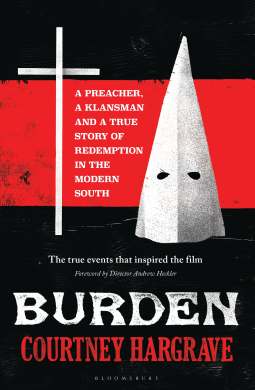
Burden
A Preacher, a Klansman and a True Story of Redemption in the Modern South
by Courtney Hargrave
This title was previously available on NetGalley and is now archived.
Send NetGalley books directly to your Kindle or Kindle app
1
To read on a Kindle or Kindle app, please add kindle@netgalley.com as an approved email address to receive files in your Amazon account. Click here for step-by-step instructions.
2
Also find your Kindle email address within your Amazon account, and enter it here.
Pub Date Aug 14 2018 | Archive Date Jun 10 2019
Talking about this book? Use #Burden #NetGalley. More hashtag tips!
Description
Racism is a strange organism. A living thing. You can trim the branch, you can try to cut it out by the root, you can bury it deep in the ground and deprive it of light. But when the conditions are right, it blooms.
Until the afternoon of March 1, 1996, not many people
beyond the Upstate had heard of Laurens. Certainly the residents could not have
anticipated the sudden influx of national attention. About the only sign of
anything unusual at all had been the banging of hammers and the cutting of
plywood, sounds of construction ringing out from the old Echo theater. But when
the block letters were finally slid into the marquee, announcing the name of a
new business, the Redneck Shop and “World’s Only” KKK Museum; when the theater
turned out to be owned by two proud Klansmen; when reporters started to descend
on Laurens from New York and Washington and Los Angeles, then from as far away
as Australia and Japan; when the courthouse square became the site of violent
protests and general unrest, just about everyone in town claimed to have been
blindsided.
In 1996, the town of Laurens, South Carolina, was thrust into the international spotlight when a white supremacist named Michael Burden opened a museum celebrating the Ku Klux Klan on the community’s main square. Journalists and protestors flooded the town and hate groups rallied to the establishment’s defence, dredging up the long history of racial violence in this formerly prosperous mill town.
Shortly after his museum opened, Michael Burden abruptly left the Klan at the urging of a woman he fell in love with. Broke and homeless, he was taken in by Reverend David Kennedy, an African American preacher and leader in the Laurens community, who plunged his church headlong in a quest to save their former enemy.
In this spellbinding Southern epic, Courtney Hargrave explores the choices that led to Kennedy and Burden’s friendship, the social factors that drive young men to join hate groups, the intersection of poverty and racism in the divided South and the difference one person can make in confronting America’s oldest sin.
Available Editions
| EDITION | Hardcover |
| ISBN | 9781408892619 |
| PRICE | £16.99 (GBP) |



